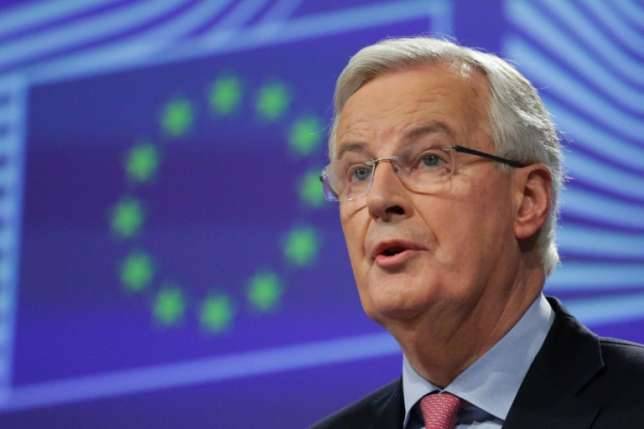BRUSSELS - British Prime Minister Theresa May angrily rejected a draft divorce treaty unveiled by the EU on Wednesday, saying she would never allow the bloc to undermine her country’s “constitutional integrity”.
May lashed out at the proposal to keep British-ruled Northern Ireland in a customs union if there is no better solution to avoid a hard border with EU-member Ireland. The European Union’s chief Brexit negotiator Michel Barnier insisted that the plan was not designed to “provoke”, and denied that it threatened the sovereignty of the UK.
The EU’s draft withdrawal agreement spells out the details of a provisional deal sealed in December by May and European Commission chief Jean-Claude Juncker, which largely fudged the Irish question.
“The draft legal text will, if implemented, undermine the UK common market and threaten the constitutional integrity of the UK by creating a customs and regulatory border down the Irish Sea and no UK prime minister could ever agree to it,” May told parliament.
May added that she will “be making it crystal clear to President Juncker and others that we would never” agree to Northern Ireland having different customs rules to the rest of the United Kingdom.
The 120-page EU draft agreement says that in the absence of another plan, “a common regulatory area comprising the Union and the United Kingdom in respect of Northern Ireland” would be set up.
This would involve a “an area without internal borders in which the free movement of goods is ensured and north-south cooperation protected,” it says.
Barnier said it was merely a “fallback” in case Britain’s two preferred options - hi-tech frictionless border controls, or a solution linked to a future EU-UK trade deal - both fell through. “My personal opinion is that this backstop will not call into question the constitutional or institutional order of the UK,” the former French minister said. “I’m not trying to provoke, I’m not trying to create any shockwaves,” Barnier added, calling on Britain to “keep calm and stay pragmatic”.
Ireland and the EU have called for any Brexit agreement to avoid a hard border including customs checks, in order to protect the 1998 Good Friday agreement in Northern Ireland, which ended three decades of bloody sectarian violence.
Barnier meanwhile warned that negotiations on Britain’s departure in March 2019 must accelerate in order to succeed. “If we wish to make a success of these negotiations - and I certainly do - we must pick up the pace,” Barnier said.
It was still far from certain that a post-Brexit transition period - when Britain will continue to follow EU law in return for access to the bloc’s single market - would be sealed at a summit next month, he warned.
Barnier on Tuesday said the bloc ruled out an “open-ended” phase mooted by Britain and wanted a “short” transition ending on December 31, 2020.
The draft agreement also covers issues from December including the rights of EU citizens living in Britain, and the financial settlement Britain will pay as it leaves the EU, set to be £35-£39 billion (40-45 billion euros, $47-52 billion).
But it is the Irish issue that remains the most sensitive topic, with May’s fragile Conservative government propped up by pro-British MPs in Northern Ireland.
Arlene Foster, leader of the Democratic Unionist Party (DUP), whom Barnier will meet next week, said the EU draft was “constitutionally unacceptable and would be economically catastrophic for Northern Ireland.” May also has to keep key eurosceptics in her cabinet onside.
British Foreign Secretary Boris Johnson caused a stir with a leaked letter that cast doubt on avoiding a hard Irish border.
Speaking to Sky News, Johnson said the row was “being used quite a lot politically to try to keep the UK in the customs union, effectively in the single market, so we can’t leave the EU”.
May will give a keynote speech on Friday finally setting out her vision for post-Brexit ties, while the EU will set out its own red lines at a summit in March.
Pressure on May mounted this week when opposition Labour leader Jeremy Corbyn announced a policy shift in favour of staying in a customs union with the EU.






